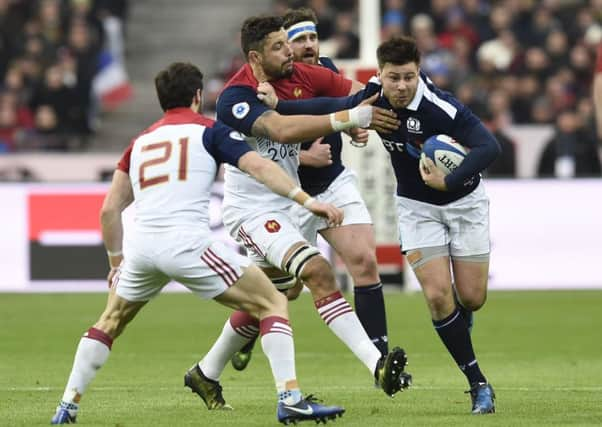Allan Massie: Scotland's backs have scored 51 Test tries


So we have more firepower than we used to. The back division that will start this afternoon has scored a total of 51 international tries: Stuart Hogg 16, Tommy Seymour 14, Tim Visser 11, Alex Dunbar six, Finn Russell two and Huw Jones two from only five games. Only Ali Price hasn’t yet scored a try – and he hasn’t yet played 80 minutes of international rugby.
Of course, Wales have try-scorers too, lots of them, with George North, who has scored in his last five Six Nations games, leading the way, while Liam Williams scored a lovely try from a planned move against England. Wales are working towards playing a more expansive game than in recent years, a game more in line with the traditions of Welsh rugby. If the rain holds off, today’s match should sparkle. That said, it’s usually the quality of the defence that decides the result.
Advertisement
Hide AdAdvertisement
Hide AdWe can feel more optimism than appeared likely a few days ago, when our injury list seemed alarmingly long. Greig Laidlaw’s absence will be felt of course. He has been the controller and guiding spirit for at least a couple of years now, and a wonderfully reliable goal-kicker. Still, young Ali Price has qualities of his own and, in the Champions Cup, has shown himself to be a big-match player. He has a sharper break than Laidlaw and being left-footed gives us an alternative exit from our own 22. He is one of these scrum-halves who makes things happen, just as Mike Blair, his mentor at Glasgow, was. I hope he won’t overdo the tap penalty. There are times when a cool head and a kick for touch into the opposition 22 is the more intelligent option. There was one such occasion near the end of the match in Paris. On the other hand, Price is the sort of scrum-half who asks testing questions of the opposition back row.
Wales have a terrific back-row, so good than Toby Faletau isn’t starting. We may miss the ball-carrying power of Josh Strauss, but John Barclay, Ryan Wilson and John Hardie have all played openside and are proven ball-winners at the breakdown. They will have to be at their best there, up against Sam Warburton and Justin Tipuric. In the back division, Dunbar has won more turnovers than any other centre in the tournament.
Wales probably have an advantage when it comes to goal-kicking. Russell has kicked well for Glasgow in the Champions Cup, but he isn’t as reliable or experienced as Leigh Halfpenny. I say “when it comes to goal-kicking” because, against England, the Welsh captain Alun Wyn Jones twice turned down the chance to ask Halfpenny to kick penalties, one in front of the posts, and Wales failed to score a try on both occasions. He once opted for a scrum close to the English line, and Wales conceded a penalty. It’s daft to go for a scrum unless you have an assured ascendancy because you are gambling on the referee and referees at scrum-time are kittle-cattle.
The Scottish scrum suffered in Paris and conceded a string of penalties. It’s been a worry ever since Willem Nel and Alasdair Dickinson were ruled out by injury. Gordon Reid, who replaces Alan Dell at loosehead today, has done pretty well for Glasgow in the Champions Cup and this Welsh front-row is not as formidable as the French or, indeed, as the Welsh was when Gethin Jenkins and Adam Jones were in their prime. So we may hope for a more even contest and it’s also the case that both front-rows should know pretty well how today’s referee, John Lacey, referees the scrum.
Wales have won on their last four visits to Murrayfield, a place they used to approach with some foreboding – even in the great days of Gareth and Gerald and JPR they lost a couple of times there. Time surely to bring the present sequence to an end.